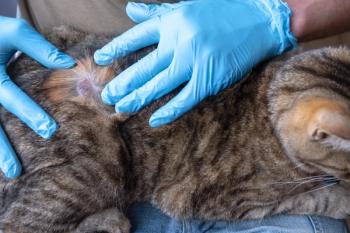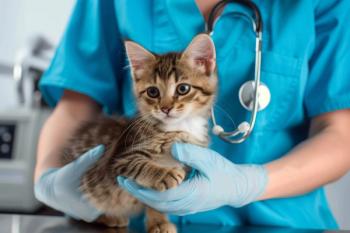
Herriott's Legacy
James Herriot's books sold some 70 million copies worldwide. Yet, veterinarian, author and son James Wight never lived in the shadow of that legacy.
THIRSK, ENGLAND
His father inspired a generation.
James Herriot's books sold some 70 million copies worldwide. Yet, veterinarian, author and son James Wight never lived in the shadow of that legacy— instead, he caught it, embraced it, nurtured it and even turned into a second career of sorts.
A letter worth writing
Pulled into veterinary medicine by his father's influence, the 64-year-old Wight penned Herriot's biography, "The Real James Herriot: A Memoir of My Father," after retiring from veterinary practice in 2001.
He palpates retirement with a regimen of public speaking and raising money for charities after selling his practice. In an exclusive interview with DVM Newsmagazine, Wight talks about his career, dynamic changes facing the profession and his famous father's influence on veterinary medicine.
"People are still interested in his life," he says.
Many of Alf Wight's (James Herriot's real name) messages from a bygone era hold deep-seated truths for veterinarians, even in 2007. The reason? Veterinarians and pet owners still identify with his stories, catapulting this part-time author and full-time veterinarian to worldwide fame. Of which he sought none, Wight adds.
His books are about respect for life, the animals we care for, good storytelling and, best of all, human behavior, the ultimate punchline, Wight says.
All creatures small: Dr. James Wight says that the changes facing veterinary medicine are global in scope. Veterinary work in animal agriculture has steadily shifted to companion-animal medicine. Some areas in England are going without access to veterinary care entirely, he tells DVM Newsmagazine.
"By his writings, he put this profession right on the map. That is what he did," Wight says. "He also put it in a good light; this is the thing.
"He wasn't an author to me. He was a friend, father and professional colleague. That is how he wanted it. It made very little difference."
Jimmy Wight, who was introduced in later Herriot books and portrayed in a BBC series, launched his career as a veterinarian at the ripe age of 5. In fact, a farmer told him later that he used to walk around professing to be a veterinarian.
Destiny won. "I knew then what I wanted to do with my life," he recalls.
After graduating from Glasgow Veterinary College in Scotland, he spent the next 30 years "with my arm up a cow's backside," he says with a laugh.
A different world?
Dynamic changes to the veterinary profession during the last decade would have astounded Wight's father:
- The sophistication of the medicine
- The shift in the demographic makeup of the profession
- The role veterinarians play in public health
- Steady migration from its roots in agriculture to companion-animal medicine
Consider Thirsk in the United Kingdom.
Wight joined the practice in 1967, working with his father and Dr. Donald Sinclair (aka Sigfried Famon), two of the funniest men he has ever known.
"It has gone from 100 family farms to 15. A lot of veterinary practices now are just not doing any farm work at all. There are areas in the country with just a few animals (that) are having difficulty getting any veterinarians to visit them. That is how bad it has gotten."
The same trend envelops the United States.
"As my dad used to say, the profession rises and falls with the with the farming industry." Not any more.
"I think one of the reasons James Herriott's books are so interesting to the veterinary profession (is that) they are history, of course, these books. He saw huge changes, too. He started practice when they used horses to plow fields. He saw the mechanization and the horse going out. He lived through the rise of British agriculture after WWII, the boom in the 60s and 70s and then the decline. He also saw the small-animal work coming in."
Wight's sister, Rosie, wanted to be a veterinarian, but Alf talked her out of it.
"My father put her off because he thought it was too rough-and-tumble for a woman. Now, in our country 80 percent of graduates from veterinary schools are women. Women are doing just fine. It's rough-and-tumble with dogs and cats. I've had a few rough-and-tumbles with hamsters and gerbils," he says, chuckling.
"It used to be such a macho profession. You stripped to the waist for everything. I worked for a vet once who had to strip off to the waist to vaccinate a puppy. Things have changed. It has made great strides, this profession. It is more advanced and knowledgeable, more sophisticated, more clever and undoubtedly more stressful."
The art of science
There are approaches to veterinary medicine that transcend time.
Alf Wight used to call it the old rules of veterinary medicine.
- "The art, if anything, is more important than the science."
- "Always be nice to people who are going to pay you money."
- "It's not what you do, but the way you do it."
As a vet, he probably wasn't a pioneering surgeon, Wight adds, but he cared about his patients and clients.
" 'Always do your best,' he used to say. 'A farmer here is a hard man to impress. A farmer will forgive you if you make a mess of something if he feels you have done your best. You will not be forgiven if you show disinterest.' "
Described by his son as modest, retiring and somewhat shy, Herriot simply looked the other way from fame, and so did everyone in his town.
"He always used to say, you are never a prophet in your own land." And the town treated his fame the same way.
"He was one of the lads, just one of the guys. He's one of us. It suited him just fine." The drive to write a book was always there. By all accounts, Herriot was a well-read man. "His bed was surrounded with mountains of books everywhere. You couldn't even see his head when he was in bed," Wight says.
His first success, "All Creatures Great and Small," took six years to write, with rejections from publishers along the way.
Yet, it was considered an overnight success, spawning six other books, movies and a television series. Adulation from the United States also came and Herriot found his celebrity status puzzling, Wight says.
For son and biographer, Wight soon found that writing and publishing a book, even with a subject he knew very well, was arduous work. "It was two years of intensive work. Not only about writing the thing, it was about the research."
The work offered new insights into his father's upbringing and education, and was a fitting end to a veterinary career that spanned three decades.
Destined to be a veterinarian
Jimmy Wight accumulated some practice stories in his own right. One experience was unforgettable. It happened during his fourth year of veterinary school in his first practice outing in Staffordshire.
"The owner was an absolute rebel," Wight recalls.
"He put two fingers up to authority. I was in my fourth year, and he said to me, 'I am going to New York, Shamus.' He always called me that. 'You are going to run the practice.' "
"I told him I wasn't qualified."
"He repeated, 'You are going to run this practice.' "
"So, away he went. And I was left to run this practice as a student (with a) pile of textbooks. The very first case I got was a calving case. I vividly remember the guy on the phone: 'I have been calving cows all my life, and I have never been beaten yet. But this one is going to be a tough one. I need professional assistance.'
"I got there, and I felt three feet coming forward and no head."
Panic. Indecision. Trying to cast an air of competence — the emotions were all in play that day. But Wight did what any sharp, aspiring veterinary student should. He called a neighboring practitioner to help.
Newsletter
From exam room tips to practice management insights, get trusted veterinary news delivered straight to your inbox—subscribe to dvm360.




